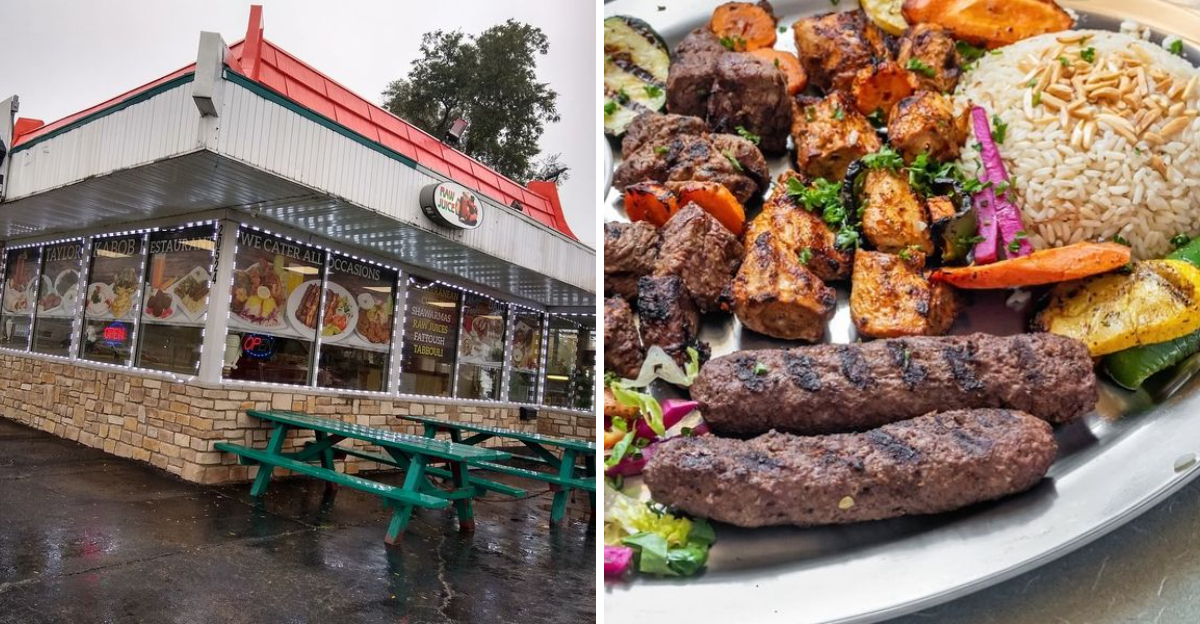
Michigan might not be the first place that comes to mind when thinking about authentic kebabs, but this Midwestern state has developed a remarkable kebab scene that draws food lovers from across the country. Over the past decade, skilled immigrant chefs have transformed Michigan’s food landscape with traditional cooking techniques and family recipes passed down through generations.
The unique blend of Middle Eastern, Mediterranean, and local Michigan flavors has created a kebab culture unlike anywhere else in America.
1. Dearborn’s Middle Eastern Heritage Transformed Local Food Culture
Long before kebabs became trendy nationwide, Dearborn was quietly building America’s most authentic Middle Eastern food scene. It is widely known as a cultural center for Arab Americans, with one of the highest proportions of Arab descent in any U.S. city. Restaurants serving Middle Eastern and Mediterranean food are abundant.
Many families have passed down recipes for kebabs, shawarma, hummus, and more. One local restaurant even received national recognition for its authentic offerings. Dozens of eateries line Michigan Avenue and other corridors in Dearborn and Detroit.
This dense cluster of authentic establishments ensures that serious kebab culture thrives. The local demand for real charcoal grilling and fresh meat encourages kitchens to maintain tradition rather than simplify for mass appeal.
2. Malek Al-Kabob And Star Kebabs
Among Dearborn’s heavyweights is Malek Al-Kabob, which offers real Middle Eastern food across multiple Michigan locations. Their fare includes kababs, shawarma, and sides typical of Levantine establishments.
Their reputation is built on consistency, flavor, and generous portions. Another name locals mention often is Al Ameer, a landmark for those craving kebabs and family-style meals.
These restaurants demonstrate that Michigan’s kebab culture is not niche; it is mainstream and firmly rooted in the community. Both newcomers and longtime residents see these kitchens as a part of daily life. Their continued popularity shows how deeply ingrained kebabs are in Michigan’s dining landscape.
3. Street Food & Mediterranean Food Trucks
Kebab and Mediterranean food trucks operate across the Detroit metro area, bringing grilled meats, wraps, and sides to neighborhoods that may lack brick-and-mortar restaurants. Trucks like Shawarma Chef or King Kabob Xpress serve compact menus featuring kababs, shawarma, rice plates, and grilled vegetables.
Their mobility means diners outside Detroit proper can access kebab-style fare in suburbs or during festivals. The trucks often appear at summer events, offering authentic food to large crowds. Some even keep late hours, making them a resource for after-show or post-work cravings.
Their flexibility and direct connection with local farmers also highlight the state’s agricultural strengths. These trucks expand access while keeping traditional flavors alive.
4. Evolution Over Purity, Not Fusion Fantasies
While some chefs experiment, most Michigan kebab kitchens emphasize fidelity to tradition over exotic mashups. The regional identity comes from consistency, not from creating new fusions with cherries or maple syrup.
Menus remain focused on lamb, chicken, beef kababs, and classic mezzes like hummus and baba ghanoush. Restaurants invest in charcoal grills, vertical spits, and spice blends passed down through families. Small touches, like sourcing local produce, do occur, but they rarely alter the essence of kebabs.
The emphasis is on authenticity and preserving cooking traditions. The consistent flavors and methods are what make Michigan’s kebabs stand out. Visitors expecting something unusual will instead find faithful renditions perfected over decades.
5. Community, Tourism & Reputation
Food tourism in Michigan gets a boost from those eager to try authentic kebabs in non-coastal states. Many travelers see Detroit-area kebab halls as a must-visit part of their trip. The presence of so many authentic restaurants in close proximity gives visitors a concentration of options seldom found elsewhere in the U.S.
Because of this density, walkable food tours and restaurant crawls have developed informally among locals. Some hotels in the Detroit area recommend Middle Eastern restaurants prominently to guests.
While official “kebab trails” are not documented, visitors regularly create their own itineraries. The impact is clear: kebab cuisine contributes not just to restaurant culture but also to the wider tourism economy.
6. Challenges And Authenticity Balances
Maintaining authenticity is not without challenges. Rising ingredient costs, competition from larger chains, and diner expectations for speed push some restaurants to adapt. Some newer establishments may use faster cooking methods, but many traditional ones resist shortcuts.
Restaurants that emphasize heritage continue skewering meat by hand, marinating overnight, and grilling over charcoal or wood. Regulations and halal certification requirements add complexity. Food trucks, meanwhile, face Michigan’s seasonal weather challenges but remain popular in the warmer months.
Despite these obstacles, many owners remain deeply committed to quality. The effort ensures that their kebabs taste just as they would in their countries of origin.
7. What To Try & Where To Go
If you are in Michigan and want to experience its kebab culture, start in Dearborn along Michigan Avenue, where dozens of Middle Eastern restaurants cluster. Popular names include Al Ameer, La Shish, Sahara, and Malek Al-Kabob. Order lamb or beef kebabs, shawarma plates, and classic sides like hummus, rice, and tabbouleh.
Food trucks often park at community events or near commercial zones – watch for them to sample authentic flavors on the go. Visit in the evening when the grills and spits are in full swing. Don’t expect wild flavor fusions; expect tradition, bold spices, and meals made with pride.
Michigan’s kebab scene is alive, proud, and deeply tied to its communities, offering travelers a taste that rivals any in the country.
Dear Reader: This page may contain affiliate links which may earn a commission if you click through and make a purchase. Our independent journalism is not influenced by any advertiser or commercial initiative unless it is clearly marked as sponsored content. As travel products change, please be sure to reconfirm all details and stay up to date with current events to ensure a safe and successful trip.